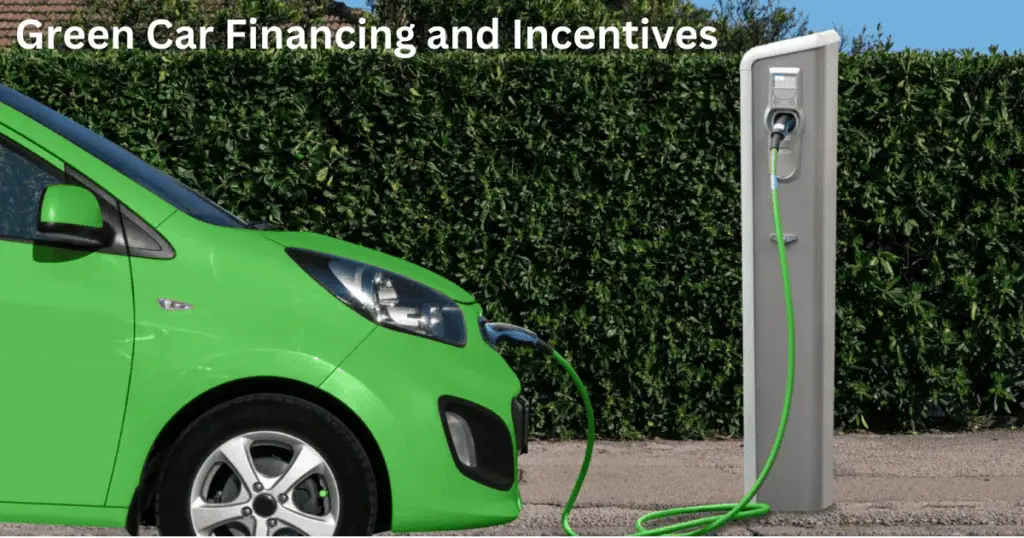In our ever-evolving world, where environmental consciousness is a prevailing concern, there is an escalating demand for sustainable transportation alternatives. The adoption of green vehicles stands out as a pivotal measure in curbing carbon emissions. These environmentally friendly automobiles not only diminish our carbon footprint but also hold the promise of long-term economic advantages for consumers. However, transitioning to green vehicles can entail a substantial financial commitment. This evaluation revolves around the subject of Green Car Financing and Incentives with the intention of furnishing valuable insights regarding the transition towards a more environmentally conscious mode of transportation while sidestepping financial burdens.
1. Understanding Green Car Financing
Financing Options
When contemplating the acquisition of an eco-friendly vehicle, the initial stride involves grasping the array of financing choices at your disposal. Green vehicles manifest in diverse configurations, including hybrids, electric cars, and hydrogen fuel cell vehicles, each characterized by its distinct attributes and financial requisites. Let’s embark on a synopsis of the financing alternatives accessible for these green automobiles:
Traditional Auto Loans
Traditional auto loans are a common choice for financing green cars. These financing options present the flexibility of either fixed or variable interest rates, enabling buyers to distribute the vehicle’s expense across an extended timeframe. To gain insights into your monthly financial obligations, online auto loan calculators come in handy, assisting you in estimating your periodic payments.
Manufacturer Financing
Many green car manufacturers offer special financing deals to incentivize buyers. These deals can include low or zero-percent APR, extended warranties, or cash rebates. Be sure to explore manufacturer financing options when shopping for a green car.
Leasing
Leasing is a popular option for green car enthusiasts. It offers lower monthly payments compared to buying, and at the end of the lease term, you can often upgrade to a newer green vehicle with the latest technology and improved fuel efficiency.
Eco-Friendly Auto Loans
Some financial institutions specialize in eco-friendly auto loans, designed exclusively for green car purchases. These loans may have competitive rates and unique terms to support environmentally conscious buyers.
Government Grants and Loans
Various government programs provide grants and loans for green car purchases. These incentives aim to encourage the adoption of eco-friendly vehicles and can significantly reduce the financial burden.
Tax Benefits
In addition to financing options, green car buyers can enjoy several tax benefits. The federal government and many states offer tax credits, rebates, and deductions for green car owners. Some notable tax incentives include:
Federal Electric Vehicle (EV) Tax Credit
The Federal Electric Vehicle (EV) Tax Credit stands as a significant financial enticement, effectively lowering the price tag of electric automobiles and making them a more wallet-friendly choice. The extent of this credit varies depending on the battery capacity of the electric vehicle, potentially leading to considerable savings, totaling thousands of dollars.
State and regional motivations
Numerous states and local authorities extend supplementary encouragements, encompassing rebates, diminished registration fees, and the privilege of accessing carpool lanes.
Depreciation Deductions
Business owners who use green cars for work purposes can benefit from depreciation deductions, reducing their overall tax liability.


2. Incentives for Green Car Buyers
Green car incentives go beyond financing and tax benefits. Various programs and incentives aim to reward environmentally conscious consumers. Let’s delve into some of these incentives:
Carpool Lane Access
Many cities and states grant green car owners access to carpool lanes, even when driving alone. This not only reduces commute times but also encourages more people to opt for green vehicles.
Reduced Registration Fees
Some states offer reduced registration fees for green car owners, resulting in yearly savings. These fee reductions can offset the higher initial purchase price of green cars.
HOV Lane Access
In some regions, green car owners can use High-Occupancy Vehicle (HOV) lanes, even with a single occupant in the vehicle. This privilege can significantly improve commuting experiences.
Charging Station Infrastructure
The proliferation of electric vehicles (EVs) has driven the expansion of charging station infrastructure. Several governments extend financial grants and incentives to enterprises and local administrations for the establishment of charging stations, thereby enhancing the convenience of recharging for owners of eco-friendly vehicles.
Cash Rebates
Cash rebates are another enticing incentive for green car buyers. Manufacturers and government programs offer cash rebates that can lower the overall cost of the vehicle.
Emissions Testing Exemptions
In regions with emissions testing requirements, green car owners often enjoy exemptions or reduced testing fees due to their vehicles’ minimal or zero emissions.
The combination of these incentives can significantly offset the costs of owning a green car, making them a financially appealing choice for many consumers.
3. The Positive Impact of Green Cars
Green cars offer a multitude of advantages that extend beyond financial benefits. Let’s explore the positive impact they have on the environment, the economy, and our overall well-being.
Environmental Benefits
In the realm of sustainable mobility, particularly exemplified by electric vehicles (EVs) and hydrogen-powered cars, a distinguishing characteristic is their emission-free operation. This underscores a resolute commitment to mitigating the discharge of harmful substances like carbon monoxide, nitrogen oxides, or particulate matter into the immediate environment. Embracing eco-conscious means of transportation not only enhances the purity of the air we respire but also assumes a pivotal role in constraining the emission of greenhouse gases, thus performing as an indispensable bulwark against the deleterious repercussions of climate change.
Cost Savings
While the initial purchase price of some green cars can be higher, the long-term cost savings are substantial. Electric vehicles, as an illustration, incur notably diminished expenditures when it comes to fuel and maintenance. The cost savings pertaining to fuel expenses can be striking, considering that electricity typically proves to be a more cost-effective alternative to gasoline.
Energy Independence
Green cars, especially those powered by electricity, contribute to reduced reliance on fossil fuels. By transitioning to electric vehicles, we reduce our dependence on oil imports, strengthening energy independence and national security.
Technological Advancements
The development of green cars drives technological innovations that benefit society as a whole. Breakthroughs in battery technology, renewable energy, and sustainable materials have applications far beyond the automotive industry.
Job Creation
The eco-friendly automotive sector has spawned a substantial multitude of employment opportunities, spanning from research and development endeavors to the various facets of manufacturing, sales, and servicing. The burgeoning expansion of this industry bears a beneficial influence on both the economy and the potential for increased job prospects.
Enhanced Resale Value
Many green cars maintain their value well, making them attractive options for resale or trade-in. Elements like economical maintenance outlays and robust market demand play pivotal roles in bolstering their robust resale worth.
When opting for an eco-conscious vehicle, you become an integral component of a collective endeavor aimed at advancing sustainability, enhancing atmospheric purity, and nurturing technological innovations that confer advantages on the broader societal spectrum. The positive impact of green cars extends far beyond the individual benefits of ownership.
Conclusion
In conclusion, Green Car Financing and Incentives is a crucial resource for those considering a shift to eco-friendly transportation. This review has highlighted the various financing options available, such as traditional auto loans, manufacturer financing, leasing, eco-friendly auto loans, and government grants. We’ve also explored the numerous incentives for green car buyers, including carpool lane access, reduced registration fees, cash rebates, and emissions testing exemptions.
Furthermore, it’s crucial to emphasize that the invaluable contributions of eco-friendly vehicles should not be underestimated. They play an integral role in cultivating a more pristine environment, realizing substantial economic savings, fortifying energy self-sufficiency, propelling technological progress, fostering employment growth, and elevating the market value of these automobiles. Opting for a green car transcends a mere personal choice; it signifies a stride towards a future that is both sustainable and enriched with prosperity.
Frequently Asked Questions (FAQs)
Q1. Are green cars more expensive than traditional vehicles?
Green cars, particularly electric and hydrogen fuel cell vehicles, can have a higher upfront cost. However, the total cost of ownership, including fuel and maintenance, is often lower, making them cost-effective in the long run.
Q2. What government incentives are available for green car buyers?
Government incentives include tax credits, rebates, reduced registration fees, and access to carpool lanes. The specific incentives vary by location, so it’s essential to check your local regulations.
Q3. How can I find charging stations for electric vehicles?
There are various online tools and mobile apps that help you locate nearby charging stations. Websites like PlugShare and apps like ChargePoint provide up-to-date information on charging station locations and availability.
Q4. Do green cars have the same performance as traditional vehicles?
Green cars, especially electric vehicles, often offer impressive acceleration and performance due to their electric motors’ instant torque. They can be as, or even more, fun to drive than traditional vehicles.
Q5. What is the range of electric cars?
The range of electric cars varies depending on the make and model. Some offer ranges of over 300 miles on a single charge, while others may have shorter ranges. It’s essential to consider your daily driving needs when choosing an electric vehicle.

